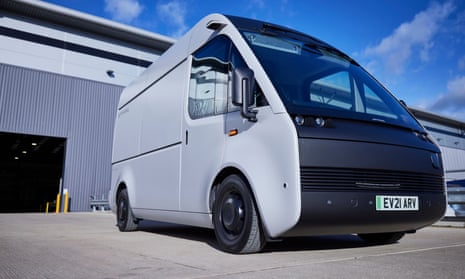
UK electric vehicle maker Arrival enters administration with 170 jobs at risk
New York-listed company, once valued at $15bn, failed to launch its debut electric van
The British electric vehicle maker Arrival has collapsed into administration – putting 170 jobs at risk – just three years after it was valued at more than $15bn.
The company, which had two manufacturing sites in Oxfordshire, has appointed consultancy firm EY as administrator, after failing to launch its debut electric van.
The move comes a week after trading in the company was suspended on New York’s Nasdaq stock exchange and a notification that the firm would be removed from the exchange was filed. Nasdaq said Arrival had not complied with its listing standards after failing to file accounts for 2022.
The EY administrators said that Arrival’s liquidity position had been “impacted by challenging market and macroeconomic conditions resulting in delays in getting the group’s products to market”.
They added: “The joint administrators are now exploring options for the sale of the business and assets of the companies, including its electric vehicle platforms, software, intellectual property and R&D assets, for the benefit of creditors.”
Arrival was founded in west London in 2014 by Denis Sverdlov, a Russian telecoms billionaire, who stepped aside in late 2022. Sverdlov sold the telecoms firm and mobile phone maker Yota in 2013.
Arrival spent heavily on robot-heavy factories in Banbury and Bicester and planned to launch a bus, car and European van. It later cut 800 jobs in the UK and switched its strategy to focus on the US van market.
The company now has 400 staff, of which 172 are in the UK and directly affected by the administration.
Arrival recently made 39 staff redundant and has struggled to keep a handle on costs, the Financial Times reported.
after newsletter promotion
The company received a $660m cash injection when it listed on the stock market in 2021 and was valued at more than $15bn on the Nasdaq at its height.
On listing, the firm had planned to focus on vans and buses before potentially moving into smaller passenger vehicles, with a focus at first on taxis, but with the possibility of cars for consumers too.
Arrival’s demise adds another failure to Britain’s mixed recent history in the electric vehicle market. Britishvolt, the electric vehicle battery maker collapsed into administration last year after struggling to secure investment. However, the Jaguar Land Rover owner Tata agreed to invest £4bn in creating a battery gigafactory in Somerset.